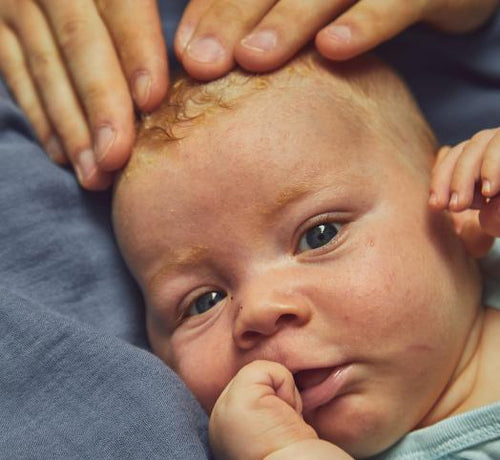Size and weight
At six months old, babies generally weigh between 6 and 9 kg. Their growth will slow a little compared with the first months of their life, and most babies measure between 62 and 72 cm. If your baby isn’t this big yet, don’t worry: as long as they are growing at a steady pace and don’t stop growing or lose weight, everything is fine.
Early learning
Your baby is fascinated by their reflection in the mirror; although they don’t yet understand, they are looking at themselves! They spend a lot of time handling their toys and are particularly fond of the ones with bright colours, soft textures, or combining music and light play. But their favourite game is still hide and seek: when you hide an object (or your face) behind a piece of material and then show it again, your baby won’t fail to respond with glee. More generally, your baby loves interacting with you. They will try to catch your attention, laugh, mimic things and emit cries of joy. They coo and gurgle and take great pleasure in repeating syllables ending in “a”: “dada dada”, and “mama mama”. These sounds don’t mean anything particular to your baby: you’re the one who will gradually attach a meaning to them by replying to them. They love seeing you arrive and saying “Mommy’s here” when they repeat “Mamamama”. This is how they discover the symbolic aspect of language: words relate to objects.
Motor skill
Your baby is highly active and has better control over their movements. They can grip their toys and let go of one if you hold out another. They can also grab objects around them, and if you remove an object they like, they will protest by crying. When you approach them, they will hold out their arms to you so that you pick them up. They’ll play with their feet and put them in their mouth when they lie on their back. When lying on their front, they’ll roll over to put themselves on their back again. When you support them standing, they’ll bend their legs - extending them and springing up and down. This is called the “jumper” stage.
Sit up!
Sitting upright is one of the biggest challenges facing your baby over the next few months. For the moment, if you put your baby on their back, they will raise their head and torso to try and sit up by themselves but won’t manage to do it. However, if you help them get into that position, they can remain sitting without support for a few moments - and they love it! This position will give them a new outlook on the world and open up possibilities: they can see everything happening and grab objects scattered around them. You can support their back with a breastfeeding cushion or bolster to make it easier for them to take advantage of this position. But for no more than a few minutes! His or her spine is still too fragile and should not be strained beyond its capabilities. They can sit up with a straight back within one or two months.
First teeth
If you see your baby bite hard into their toys, constantly suck their fingers and dribble a lot, their first tooth is probably not far away. This tooth often appears around the six-month stage, and the first tooth will generally be a lower central incisor. However, don’t worry if you can’t see teeth yet: teething times vary greatly between children. They may get their first tooth at four months or even birth - although that’s rare. On the other hand, some babies still don’t have teeth at twelve months, which shouldn’t be a cause for alarm unless associated with another abnormality.
Sleep
After their first disturbed nights, most babies sleep well between three and nine months. Don't lose patience if your baby is still awake at night! They simply need a little longer to get into their sleep pattern. If your baby is teething, they might also wake up more often at night,. Don’t worry about them developing bad habits: go to see them if they wake up and help them fall back to sleep by cuddling them, breastfeeding them or bottle-feeding them. It makes them feel calm, which is important in helping them sleep well over the long term. Within a few months, these nightly disruptions will be a distant memory!
Remember, every baby has its own pace of development; if certain milestones aren't met exactly on schedule, there’s nothing to worry about. Some developments may come a bit later, or on the contrary, some things may come earlier.



















